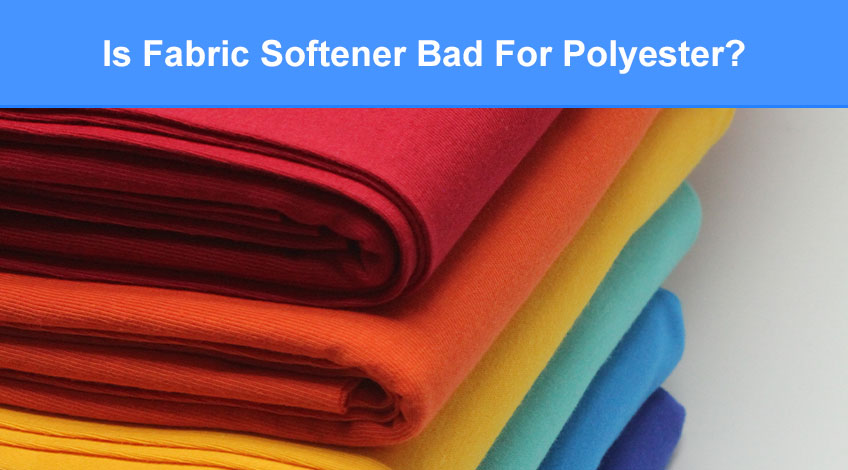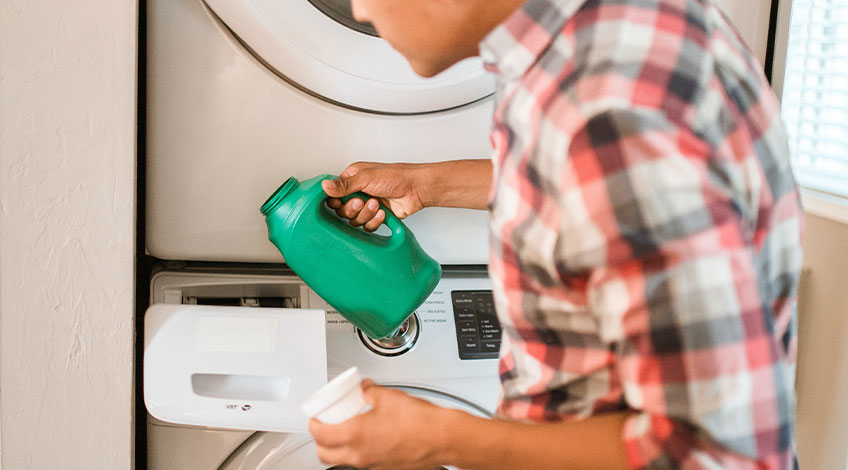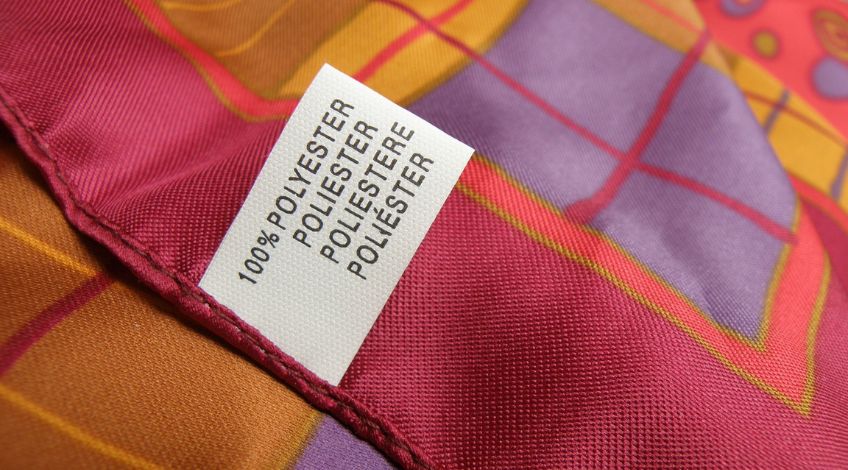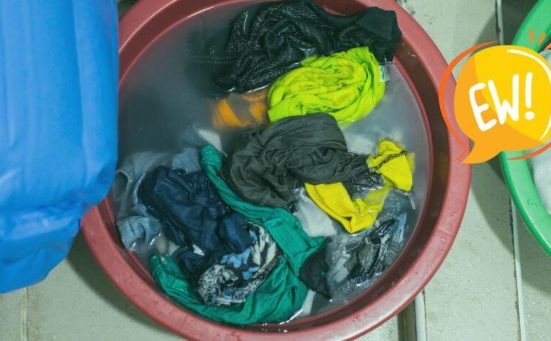
Is Fabric Softener Bad For Polyester?
More and more of our clothes nowadays are made from polyester or a polyester blend. Polyester is popular because it is known for its crease resistant properties, durability and low maintenance. Which leads to the question, is fabric softener bad for polyester? Keep reading to find out.
What Is Polyester?
Polyester is a synthetic fabric which is made from a form of plastic known as polyethylene terephthalate (PET). It is made by combining terephthalic acid and ethylene glycol.
There are some people who are opposed to polyester because its production is not from a sustainable source. However, many plastic bottles are recycled as polyester. But as it doesn’t break down too well it is somewhat problematic.
What Makes Polyester So Popular?
The main reasons that polyester is so popular include;
- It’s Durable
Polyester is a very durable fabric which is impervious to many chemicals, It is strong but lightweight. - Has Many Resistant Qualities
It is resistant to shrinking, stretching, abrasions and wrinkling. - Can Be Dyed Easily
Polyester fabrics can be dyed easily and they hold their colour. - Keeps Its Shape
Polyester clothing doesn’t go out of shape either when wearing or washing. - Quick Drying
As it doesn’t absorb moisture, polyester has quick drying properties. This makes it a popular choice for outdoor clothes. - Easy To Care For
Polyester is such an easy fabric to care for and it can be washed and dried at home.
What Is Fabric Softener?

Fabric softener was developed in the 1960s to treat fabrics after the harshness of dyes, detergents and tumble dryers. It is made from a mixture of chemical substances and is available in liquid or pod form for use in the washing machine and coated onto a plastic sheet for use in the tumble dryer.
It works by coating the fibres of the fabric of your clothes to soften clothes, reduce static and leave clothes with a fresh, pleasant fragrance. Which all sounds great but there are many concerns over the use of fabric softeners due to the chemicals used to produce it.
These concerns include health issues and serious environmental implications.
Health Issues
Many of the chemicals used to produce fabric softeners have been linked to various health concerns including;
- Hexylene Glycol
This has been linked with skin allergies, eye irritations and breathing problems and it is one of the main irritants associated with fabric softeners. - Benzyl Acetate
Benzyl acetate has been linked with pancreatic cancer. - Ethanol
Ethanol has been linked with central nervous system disorders. - Benzyl Alcohol
Benzyl alcohol has been linked with many respiratory problems including coughs, breathing issues and asthma. - Glutaraldehyde
This chemical is said to have been the cause of many skin allergies as well as asthma.
Sadly it doesn’t stop there, to reduce static buildup, fabric softeners contain quaternary ammonium cations (better known as quats). These quats are linked with skin allergies, many breathing problems, anaphylactic shock reactions and also reproductive problems.
The chemicals in fabric softener work by coating the fibres of the fabric making them slippery. This coating dries on and builds up over time. This can lead to the material becoming less able to absorb water.
Clothes get clean by absorbing water which loosens the dirt, sweat and bacteria and eventually washes them away. If the clothes lose their ability to absorb water, the dirt, sweat and bacteria will remain in the fabric.
As you can see, that’s not ideal especially when the whole idea was to clean the clothes. Worse still, is if the clothes were treated with a fire retardant. The fabric softener not only coats the fire retardant, but many chemicals in the fabric softener are highly flammable.
Environmental Concerns
Many of the chemicals found in fabric softeners are non-biodegradable which means they hang around for a very long time. Every time your washing machine rinses it expels waste water (and detergent & fabric softener) into the drain.
That water, including chemicals eventually finds its way into our streams, rivers and oceans where it damages the ecosystem. Fish, plants, invertebrates, algae, all get damaged by these harmful chemicals.
That has a knock on effect to birds and other wildlife that relies on that water or aquatic life.
Can You Use Fabric Softeners On Polyester?

If after reading all of the above, you’re still considering using fabric softener, there’s a few things you should know first. Polyester is a synthetic man made fabric that has been designed to be robust and fast drying.
Using a fabric softener can inhibit these qualities. Fabric softener can clog up the pores of the fabric making it less able to breathe and prevent any moisture wicking capabilities.
Fabric softeners can also leave a fat-like film on polyester which makes it look tired and worn. Plus fabric softener can also leave long streaky stains which can be difficult to remove.
We wouldn’t recommend using fabric softener on polyester. But if you still want to, we would suggest;
- Opt For A Liquid Softener
Liquid fabric softeners tend to be better at evenly coating polyester than dryer sheets. - Diluting It
Watering it down first to help reduce the risk of that fat-like waxy deposit. - Add It To The Rinse Cycle
This will help to prevent the softener from building up too much. - Don’t Use it On Sportswear
Sportswear is designed to wick moisture away, fabric softener will clog up the pores of the fabric making it impossible to wick.
Will Fabric Softener Damage Polyester?
Polyester is a durable fabric and is designed to be robust. Fabric softener will not damage polyester, but it can leave unsightly streaks and stains or coat the fabric in a waxy, fat-like substance.
Are There Any Eco-Friendly Fabric Softeners
You could also choose an eco-friendly fabric softener which will have less impact on the environment. Here are a few of the more popular eco-friendly fabric softeners;
Eco-Mate Fabric Conditioner
- CONCENTRATED FABRIC CONDITIONER - Our 100% plant based fabric conditioner protects fibres and leaves laundry soft and static free, providing ultimate comfort for sensitive skin. This lavender softener has a sweet and calming scent, delicately fragranced with pure lavender essential oil. (Size: 500ml x 3, Scent: Lavender)
- EFFECTIVE & LONG LASTING - Concentrated for powerful & effective natural cleaning, our fabric conditioner provides an economical high quality wash with long-lasting freshness. The conditioner is ideal for washing bedding, towels, t-shirts, jeans, work & school uniforms and more!
This product is plant based, 100% biodegradable (including the packaging) and hypoallergenic.
Tru Earth Eco-Strips Fabric Softener
- IN-WASH FABRIC SOFTENERS: Enjoy a happier, healthier, and cleaner home with the Tru Earth Fabric Softener Eco-Strips that give you the softest, clean laundry with reduced wrinkles. Add a pleasant scent with the Fresh Linen Scent Booster version
- NO MORE MESS: Tru Earth's fabric softener strips have also helped eliminate the unwanted mess from powders and liquid softener spills that leave a mess all over counters, cupboards, and floors. Comes in easy-to-use and easy-to-store packs of 32 strips
This product comes supplied in dose sized strips which are biodegradable, hypoallergenic, paraben-free, phosphate-free, and cruelty-free.
Miniml Eco Fabric Softener
- ✅ PLANT POWERED FABRIC CONDITIONER: Leaves your clothes soft, smelling great and static-free with an all natural fabric softener liquid detergent. Our naturally derived softening agents help protect fibres providing sensitive skin with ultimate comfort
- ✅ FRESH LINEN SCENT: Remove nasty odours and freshen up your clothes with our fresh linen fragrance. For best results, pour 20-50ml of our skin friendly eco fabric conditioner into your machine dispenser but not onto fabrics directly
This product is derived from plants and is all natural. It is designed to protect fibres and is hypoallergenic.
Are There Any Alternatives To Fabric Softener That Can Be Used On Polyester?
If you’ve decided that fabric softeners just aren’t worth the risk to your health or the well being of our ecosystems. There are a few natural alternatives that you can use. These include;
Using Distilled White Vinegar
- PERFECT FOR COOKING - Use in vinaigrettes, sweet-and-sour dishes, marinades, pickles, chutneys, and butter sauces. Or infuse with fresh herbs to make flavoured vinegar. Whatever the occasion our Fresh White wine vinegar will be perfect.
- FABRIC SOFTENER - This white vinegar is perfect for households that have pets and children around as well as commercial premises where health and safety is of paramount importance
Just add ½ a cup of distilled white vinegar to the rinse cycle on your washing machine. This will help soften the fabric and remove any lingering odours.
Using Bicarbonate Of Soda
- ECO-FRIENDLY: Sodium Bicarbonate / Baking Soda is one of the top eco-friendly , safe and inexpensive cleaning, baking and household products available.
- CLEANING: Baking Soda is particularly useful in food preparation, cleaning surfaces, ovens, grills, microwaves and fridges whilst also deodorising and freshening without leaving any harsh chemical smells.
All you need to do is add ½ a cup of bicarbonate of soda in with the wash cycle to soften the water and your polyester fabrics.
SEE ALSO: Does Fabric Conditioner Clean Clothes? (what does it do)
Frequently Asked Questions
Fabric softener doesn’t hurt polyester so much as stain it. Polyester doesn’t absorb water as it is plastic based. Which means that fabric softener cannot soak into the fabric. This means the softener just sits on the surface where it can cause streaks and stains.
To soften polyester clothes without fabric softener, you could try using white vinegar in the rinse or bicarbonate of soda in the wash cycle.
Polyester is a synthetic man-made fabric made from a form of plastic known as polyethylene terephthalate (PET). It is made by combining terephthalic acid and ethylene glycol.
Also, follow us on Pinterest ...








